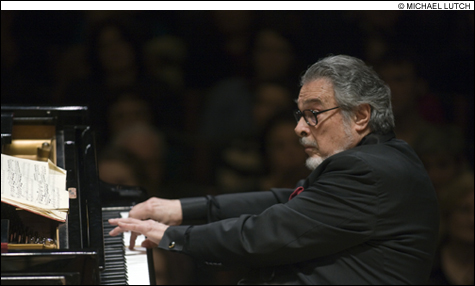
HE RAISED THE BEETHOVEN BAR IN THE ’60s: And at nearly 80, Leon Fleisher is keeping it high. |
There’s been a lot of buzz about one of the Boston Symphony Orchestra’s two new assistant conductors, 31-year-old Julian Kuerti (son of pianist Anton Kuerti), who made his BSO debut leading a program that leapt from Oliver Knussen’s The Way to Castle Yonder (three brief instrumental interludes from the second of his two Maurice Sendak operas, Higglety Pigglety Pop!) to Dvorák’s dark D-minor Seventh Symphony to Beethoven’s brilliant Emperor Concerto with master pianist Leon Fleisher. What did this rangy concert tell us about him?
Knussen’s interludes, barely seven minutes, are a complex but attractive mix of the seductively creepy and the intricately lively. (He calls the opera a “theatrical requiem” for Sendak’s dog.) Castanets, jingle bells, and tambourine create a moody fantasy world. Kuerti kept me mesmerized. But Knussen’s writing is so compact and colorful, interpretive skills may not be crucial. Dvorák requires more, such as a sense of Bohemian folk rhythms that few Americans have. Kuerti seemed both too smooth (understating Dvorák’s dynamic and rhythmic contrasts and rough edges) and too rough (in ensemble polish). This thoroughly professional, very musical performance lacked a distinctive identity.

But in the familiar Beethoven, Kuerti revealed great gifts. Placed last on the program (concertos usually close the first half), this was what most of us were waiting for — to hear Fleisher, whose Beethoven recordings in the 1960s raised the bar for all future performances. In 1965, suffering from undiagnosed focal dystonia, he lost the use of his right hand. He’s made a remarkable recovery, though his performances using both hands are still rare. So it was one of Kuerti’s jobs to keep Fleisher in the foreground, to follow where he led. Kuerti not only came through with flying colors, he put his own stamp on this warhorse, to keep Beethoven fresh, vital, and rhythmically alive.
From his first entrance, Fleisher was unmistakably himself — with that glittering sound like cascading diamonds. He kept a score on his piano (at nearly 80, does he no longer trust his memory?), and he had to keep it from sliding onto the keyboard. Yet he was focused and concentrated. He missed notes in the two fast movements (scales are still hard for him), but the section of the first movement that sounds like an otherworldly music box was as magical as ever. The songful, hymn-like slow movement unfolded sublimely. (He told WBUR’s Robin Young that playing for him was an exercise “in anti-gravity.”) At the end of the movement, the theme of the third movement appears — slow and questioning before Fleisher let it explode into pure, dancing exhilaration. The fingering may still give him problems, but the musicianship is thrillingly intact.
Mantra was a turning point for Karlheinz Stockhausen — his most sophisticated breakthrough in combining live performance with electronic manipulation. This 70-minute set of variations for two pianos also requires the pianists to play crotales and woodblocks, chant, and alter their sounds from their own electronic keyboards. Radio waves and Morse code intrude. It’s too hard to be done often. But I’ve now heard it three times since the end of November.
At WGBH, Chris Kyriakakis of the University of Southern California’s Immersive Audio Lab, in collaboration with James Donahue (who engineers WGBH’s Friday BSO broadcasts), organized a preview of a performance at LA’s Redcat, the black-box auditorium attached to Walt Disney Hall. The pianists were Katherine Chi and Hugh Hinton; Yvonne Lee digitalized Stockhausen’s 1970 synthesizing. It was marvelous. Then I was invited to participate in a post-concert panel at Redcat, where the system of 10 speakers in complex surround sound, updating Stockhausen’s original intentions, made Mantra even more exciting.
Last Friday, at 11 pm, Mantra was part of the Fromm Foundation’s four “60 Years of Electronic Music” concerts at Harvard, played by German pianists Benjamin Kobler (who worked with Stockhausen for nearly a decade before his death last year) and Frank Gutschmidt, with Hans Tutschku reproducing on four speakers (as at WGBH) Stockhausen’s original sound diffusion.
The Germans were phenomenally coordinated, and they played with both impressive accuracy and a surprising jazziness. Their perfectly timed “argument,” each responding to the other by pounding the highest and lowest keys simultaneously, was both fierce and hilarious. The sonic distortions sounded as if everything were being pedaled for maximum reverberation. And yet Chi and Hinton were more poetic. They made Stockhausen’s architectural demarcations more dramatic, so that the entire piece was more consistently engaging if not actually easier to follow, and the 10 surrounding speakers more vividly suggested Stockhausen’s “miniature of the way a galaxy is composed.”